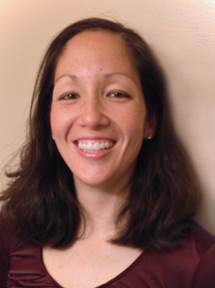
What is your scientific background?
I was conferred my PhD in Neuroscience from the Georgetown University Medical Center (GUMC) Interdisciplinary Program in Neuroscience (IPN). I studied central nervous system trauma in rodent models of contusive spinal cord injury.

My thesis centered on a specific type of progenitor cell, and its role in post-injury adult spinal cord tissue. I worked to characterize this cell population’s proliferative capabilities after injury, its ability to become neural cells in the post-injury environment, and tested various growth factors to attempt to recapitulate the cell population’s programs during development, where it gives rise to multiple cell types.
My research crossed two labs, a spinal cord injury lab at Georgetown, and a developmental neuroscience lab at Children’s National Health System. I received a Ruth L. Kirschstein National Research Service Award (NRSA) Fellowship from the National Institutes of Health (NIH) National Institute of Neurological Disorders and Stroke (NINDS). And I was able to publish three first-author peer-reviewed articles, was a contributing author on two additional peer-reviewed articles, and co-authored a review with my mentor.
How did you transition from the lab to your current job?
I left the lab a decade ago, pretty much right after receiving my doctorate. A friend and colleague of mine suggested that I apply for a Science and Technology Policy Fellowship through the American Association for the Advancement of Science (AAAS), the same organization that publishes Science magazine.
I was one of the fortunate applicants to be awarded a Fellspinowship, which started a two-year placement in a Department of Defense (DoD) agency. The Fellowship places approximately 200 scientists into various government agencies every year, where we can provide support for decision-makers in policy and project management capacities.
While I was a Fellow, I was picked up by a start-up in Maryland, and despite no experience, they hired me as their Director of Science and Technology, and later gave me the title of Director of Business Development for the DC Metro Region. They taught me business development. I also picked up personnel management experience, and was able to get a Project Management Professional (PMP) certification while I was there.
While I was a Fellow, I was picked up by a start-up in Maryland, and despite no experience, they hired me as their Director of Science and Technology.
I stayed for five years, and the company had increased in size from about 10 employees to over a hundred by the time I left. Like I said, it was a start-up, and all of the senior management had direct clients, myself included. So I maintained my full-time support position at the same government agency for that five years as well.
All told, I got 10 years of experience in five years, supporting the DoD developing extramural biomedical research programs, and learning new skills at the start-up. I took all of that experience with me as I pursued a new path outside of government-related work.
After a year-and-a-half as a Program Officer for a family foundation, I decided that business development was more my speed. And now I find myself as the Director of Business Development for the Pacific Northwest Research Institute in Seattle, where I’ve been since 2015. I found the position on LinkedIn, after searching various sources for my next career move.
The hardest part of starting at the DoD was learning how to translate my skills. Fortunately, I had a wonderful boss and mentor who really supported my professional growth. Getting out of that basic research mindset was difficult – I didn’t know what I didn’t know. And all of a sudden, I had to worry about the translation of basic and applied science, getting new technologies to our warfighters, managing multi-million dollar budgets, and worrying about the FDA process.
Being at the start-up was a little easier for me. There was a whole group of us, in a “learn-as-you-go” atmosphere. It was a lot of fun. And a lot of work.
How do you spend your day in your job?
I spend a lot of time in meetings. In business development, you have to interact with potential funders/investors, strategic partners, scientists, legal consultants, and a number of other folks. Since I work for a non-profit, the hours are very reasonable, about a 40-hour work week for the most part. But other business development roles have high demands on your time.
When I was at the DoD, I was always told, “If you have a PhD, you can learn anything.” And I’ve found that to be largely true.
When I was at the DoD, I was always told, “If you have a PhD, you can learn anything.” And I’ve found that to be largely true. While I’m more of a generalist these days, I find that my PhD training is highly translatable. I can think about things critically, draw relationships and conclusions, and communicate effectively. I also understanding the funding environment and come from a wet-lab background.
On a day-to-day basis, I interact with a lot of scientists-turned-lawyers, scientists-turned-program-officers, scientists-turned-consultants, scientists-turned-CEOs, etc. There’s almost a nod of recognition among those of us who have left the bench to pursue alternative careers.
Right now, I’m working on a couple of potential licensing deals, working with legal counsel on intellectual property related to Institute inventions, and trying to identify strategic partners for one of the Institute’s technologies that has real potential for translation. In the last couple of months, I worked with one of our Institute’s spin-offs to develop a Phase II SBIR proposal, and did the heavy lifting for the development of a new science strategy for the Institute. My job is pretty varied, and it keeps me on my toes.
What do you like most about your job?
My job requires soft skills, and the ability to interact with all kinds of people, which I like. It also requires me to flex my brain on a daily basis. As long as I’m challenged and can continue to develop my own skill set, I think just about any job would be appealing. But most of all, I find that the jobs I’ve enjoyed most have had a good team of people, including great management. But it really comes down to a good fit personality-wise. Every time I’ve left a job, it was because of a personality issue.
If you’re ready for a challenge and willing to contribute, but still open to new adventures, then the right job will find you.
I believe that having a prepared mind is the best approach. If you’re ready for a challenge and willing to contribute, but still open to new adventures, then the right job will find you. The skills you bring are important, but you also have the opportunity to learn new skills. Every job I’ve had has offered some new skill set that I didn’t previously have.
In my current position, I’m getting an education on the legal side, including intellectual property, licensing, partnership agreements, and the like. I got to witness the spinning-off of a start-up, and played a role in the secondary research that supported the establishment of that start-up.
Do you have any advice for current graduate students and postdocs looking to move out of the lab?
- Do informational interviews with anyone you can get hold of. Find out what they do, what they like and don’t like about their jobs.
- Decide what kind of culture you want to work in, whether it’s a start-up, academia, a large company, pharma, biotech, or government. Each one has its own quirks.
- Learn what you’re worth. When you’re offered a job, know how to negotiate your package. And make sure you’re satisfied with it, because you’re going to have to live with it.
- If you have the opportunity to join a start-up, do it. You’ll learn a lot, and have an invaluable experience.
- Look for internship or fellowship opportunities that are open to you.
I write a blog for Biocareers, where I talk a lot about these things. The blog has a lot of good advice for post-graduate scientists, and I encourage readers to take a look.
https://biocareers.com/bio-careers-blog
Where can you be reached if readers want to ask you more about your job?
I can be contacted through LinkedIn (https://www.linkedin.com/in/judylytlephd/) or via email (judy.lytle@gmail.com).
Comments